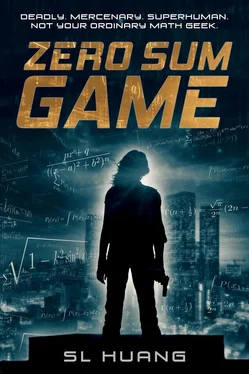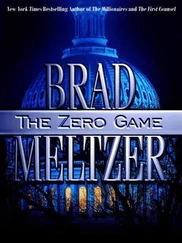“They’re not very understandable, you know,” he shot back. “I refuse to document my code.”
“I’m very smart.”
Checker’s jaw jutted out, and I thought he was going to argue further, but instead he broke eye contact and stabbed at his computer keys. “Fine. Knock yourself out.”
The other monitor filled with dense programming code. I scrolled, letting my brain relax into it, my headache finally dissipating as the mathematics rose in ghostly shadows, the edges of the algorithms sharpening and focusing into the barest outlines of a skeleton. The code wasn’t a language I recognized—possibly it was one Checker had invented himself—but the structure was familiar; it filtered through my senses and solidified, the commands looping and interlocking through layer after layer of abstraction, the elegant constructions jigsawing deep into the program.
Checker was watching me closely. I ignored him and kept scrolling.
“Well, I’m going to get some sleep,” said Tresting to no one in particular. “You kids have fun.” He meandered over to a couch against one wall of the office and stretched out, sagging to unconsciousness right away.
Checker was still watching me through his screen. I pretended to be too absorbed to notice. After a few minutes he turned his attention back to his own machines and began working on something on a monitor out of frame, but he left the video link open and kept glancing over at the camera. I refused to give him the satisfaction of asking any questions.
Checker didn’t say anything else, but other windows eventually popped up on my screen with notes on the murder they were pinning on Courtney, followed by file after file of data tables. The numbers sorted themselves in my head and fell into place, matching up with variables in the algorithms until the statistical analysis unfolded before me. Yet another document appeared a short time later, this one tracking instances of the “Pithica” reference.
Tresting and Checker had started with the journalist’s research. Reginald Kingsley had been considered top-notch in the journalism community, Pulitzer Prize and all. He’d had his fingers in a lot of different stories, and at some point he’d started keeping a log of mysteries that didn’t quite add up, events that didn’t jive or were short a solid explanation. He had been in Los Angeles researching an article when he reportedly decided life just wasn’t worth it anymore.
Kingsley’s suicide had made a big splash in journalistic circles, the newsworthiness exaggerated by his wife Leena Kingsley’s insistence that it was one hundred percent definitely faked. Other than her sworn declaration her husband wouldn’t have taken his own life, she cited two grammatical mistakes in his supposed suicide note as her proof. The “mistakes” weren’t anything I would have recognized as wrong, and I understood why segments of the press had started to mock Dr. Kingsley’s adamant assertion that her husband never would have split an infinitive in a hundred billion years and this should be proof of a nefarious cover-up.
It turned out the suicide (or murder) had happened almost six months ago now and had led to a lot more tragedy than a wife losing her husband. Dr. Kingsley, who had been a professor of Asian studies at Georgetown and had just been tapped as a Foreign Service Officer by the White House when the tragedy struck, developed a reputation as slightly mad, and her previously illustrious career fractured and tanked. She became obsessed with solving the mystery of her husband’s death, moving herself and her son out to Los Angeles permanently after losing her State Department commission and resigning her professorship. Once the LAPD threw her out as a distraught crackpot enough times, she hired multiple private investigators, but from the file, I gathered Tresting was the only one who had stuck it out and given her story any credence.
Tresting had gone back through every story Kingsley-the-husband had been working on, systematically analyzing lists of possible enemies and one by one eliminating them all as suspects in his murder. And then, with Checker as his computing partner, he dove into evaluating Kingsley’s journal of inconsistencies.
I skimmed the entries. A senator making an about-face decision on a key issue. The FBI discarding a star witness and screwing themselves out of a titanic RICO takedown. An entire notorious human trafficking ring simultaneously deciding to turn themselves in to the police. Tresting’s notes showed a massive amount of legwork—phone calls and meetings and tracking people down—but he had reached no conclusion other than that he had stumbled into the Twilight Zone.
The strange cases went back years, and in a statistically significant percentage, Checker’s digging had found one common thread: the word “Pithica.” Scraps of memos, snatches of conversations, a whisper of a whisper with six degrees of separation from the actual event…but a connection.
Checker had tried researching the word. Like Anton, he had discovered a few blink-and-you-miss-it references to a shadowy government project in scattered classified documents. Unlike Anton, however, he’d also found a few brushes with CIA paperwork, including a comparison to a covert ops project codenamed Black Gamma, which a notation in Checker’s colorful hyperbole explained was “well-known for collapsing spectacularly in the faces of its creators.” Pithica had been a failure, too, then? That didn’t seem to match up with the rest of the data, Pithica’s ghostly reach appearing to affect events from the local to the national to the global.
I sat back and rubbed my eyes. Tresting’s wild conspiracy theories were becoming a lot harder to dismiss.
Checker swore softly, interrupting my thoughts. “Arthur. Wake up,” he said.
I turned to call to Tresting, but the PI had woken at the sound of his name. He came back over to stand behind me. “What is it?”
Checker reached out and smacked the side of a screen I couldn’t see. “The GPS tracker. We lost the signal.”
Tresting cursed as well and dug into his pocket, pulling out the receiver to check for himself. He cursed again. “What happened?”
“Dunno,” said Checker. “Could be a malfunction. Could be interference. Could be they went down in the Gulf of Mexico.” His attention was still on one of his other monitors, his fingers clicking so rapidly on a mouse that he resembled a telegraph operator. “Me, I’d bet on the cynical side. Even if our girl passed the tracker and it landed in a toilet, it still should’ve kept the signal on the plane for us.”
Tresting sank into his office chair. “After all that, she disappears.”
I wondered if my client was dead. I tried not to think about it.
“They didn’t file a flight plan, but the great circle trajectory would have led over Colombia,” Checker said. “Just saying. It might be where they were headed.”
“Colombia,” Tresting mumbled. “Right. Of course.”
I tapped the screenful of data still in front of me. “I haven’t finished going through this. Did you find the connection between Pithica and the drug cartels?”
Checker leaned back, for the first time looking tired. “Who knows? Sometimes they seem to want to shut the cartels down. Sometimes they keep them from getting shut down. I’m starting to think they’re just Chaotic Neutral.”
“Doesn’t help us much now, anyway,” Tresting said softly. “A country’s an awful big place to find a few ghosts.” He raised his head to me. “Your gal killed Mr. Kingsley. Got no doubt on that. But me, I wanted whoever put her up to it.” He closed his eyes, his body slumping.
“Hey, chin up, Detective,” said Checker. “Before you fly into a fit of despair, I might have another lead for you here in the City of Angels. While you have been snoozing, I have been managing, with an impressive degree of success, to track Dawna Polk.”
Читать дальше












